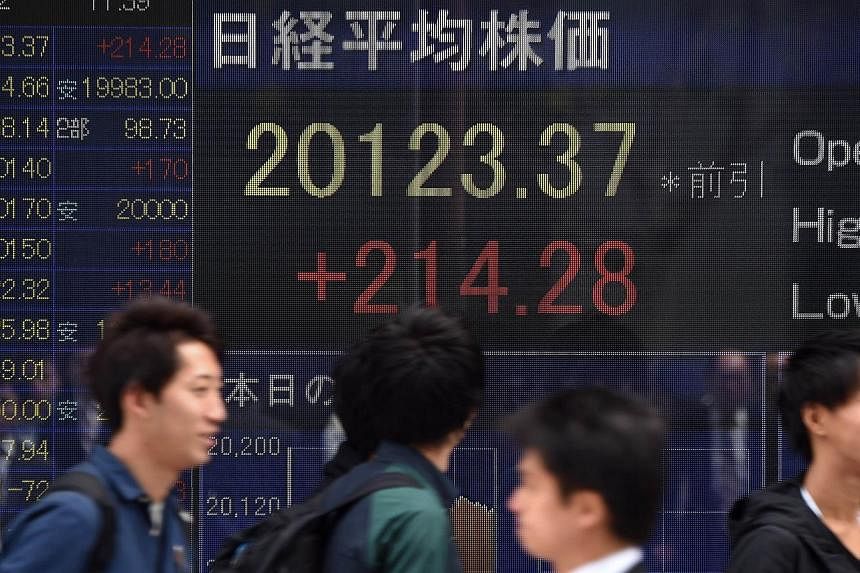TOKYO (AFP) - Tokyo's benchmark index closed above 20,000 on Wednesday for the first time in 15 years as hopes for strong Japanese corporate earnings drove the market higher, despite a weak lead from Wall Street.
The Nikkei 225 index at the Tokyo Stock Exchange added 1.13 per cent, or 224.81 points, to finish at 20,133.90. It last closed above the psychologically important level in April 2000.
That puts the Nikkei at a mark last seen when Sony's groundbreaking PlayStation 2 hit the shelves, the Dot-com bubble was collapsing and Bill Clinton still occupied the White House.
The broader Topix index of all first-section shares climbed 0,80 percent, or 12.91 points, to end at 1,621.79.
Investors were now focusing on the start of Japanese earnings season with many firms set to report bumper fiscal-year profits.
Major companies including Toyota, Sony, Japan's biggest banks, and Canon are reporting earnings over the next couple of weeks.
"Since the Nikkei is a simple average of 225 (companies), what's behind its rise is expectations for higher corporate earnings," Toshihiko Matsuno, senior strategist at SMBC Friend Securities, told AFP.
"Where the market will go from here depends on how company earnings fare." A pending trade deal could also push the market higher, he added.
Tokyo and Washington emerged on Tuesday from marathon talks on a Pacific-wide free trade area saying they were close to an agreement.
Japanese Prime Minister Shinzo Abe is hoping that the Trans-Pacific Partnership (TPP) - which includes a dozen nations accounting for about 40 percent of the global economy - will help him push through reforms to the protected agricultural sector, a key element in his wider bid to stimulate growth in the world's number three economy.
"(The Nikkei) could climb higher if TPP talks reach an accord, sparking hopes for the promotion of external trade," said Matsuno at SMBC.
Adding to upbeat sentiment Wednesday, fresh data showed Japan posted its first trade surplus in nearly three years in March as import bills fell owing to tumbling oil prices while the value of exports to North America soared.
Investor were also buoyed by a wave of global monetary easing, most recently with China loosening its credit grip on Sunday.
The Nikkei finished 2014 just short of its highest level since before the global financial crisis. And in 2013 it surged 57 per cent - its best annual return in four decades - helped by the Japanese premier's growth blitz.
The index was below 10,000 when Abe came to power.
In 2000, Japan was about a decade into a long-term economic malaise after a property and stock market bubble drove the Nikkei to an all-time high of almost 39,000 in the last days of 1989.

